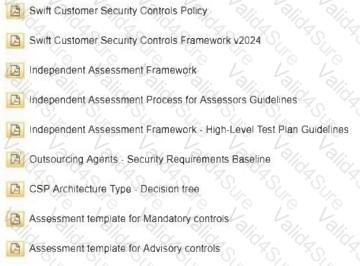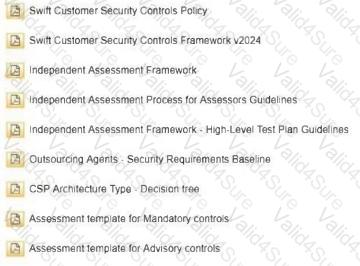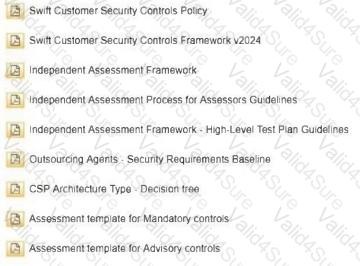- Home
- Swift
- Customer Security Programme (CSP)
- CSP-Assessor - Customer Security Programme Assessor Certification(CSPAC)
CSP-Assessor Exam Dumps - Customer Security Programme Assessor Certification(CSPAC)
Alliance Lite2 only supports the sending and receiving of FIN messages.

TRUE
FALSE
Answer:
Explanation:
This question examines the messaging capabilities of Alliance Lite2 under the Swift Customer Security Programme (CSP).
Step 1: Understand Alliance Lite2
Alliance Lite2 is a lightweight Swift solution designed for smaller financial institutions, providing access to Swift messaging services. Its capabilities are detailed in theSwift Alliance Lite2 User Guideand referenced in theCSCF v2024context.
Step 2: Analyze the Statement
The statement claims that Alliance Lite2 "only supports the sending and receiving of FIN messages." FIN messages are part of the FIN service for payment transactions, but Alliance Lite2’s scope extends beyond this.
Step 3: Evaluate Against Swift Guidelines
TheSwift Alliance Lite2 User Guidespecifies that Alliance Lite2 supports multiple message types, including:
FIN messages(e.g., MT103 for payments).
FileAct(for file transfers).
InterAct(for real-time messaging).
TheCSCF v2024does not restrict Alliance Lite2 to FIN messages; it applies security controls to all supported services. TheSwift CSP FAQconfirms that Alliance Lite2 users must comply with controls for all active services, not just FIN.
Thus, the statement that it "only supports" FIN messages is false, as it also supports FileAct and InterAct.
Step 4: Conclusion and Verification
The answer isB, as Alliance Lite2 supports more than just FIN messages, including FileAct and InterAct, per theSwift Alliance Lite2 User GuideandCSCF v2024.
References
Swift Alliance Lite2 User Guide, Section: Supported Services.
Swift Customer Security Controls Framework (CSCF) v2024, Control 1.1: Swift Environment Protection.
Swift CSP FAQ, Section: Alliance Lite2 Scope.
As a Swift CSP Certified Assessor, I left the listed provider and started to work independently. Can I continue to perform CSP assessments?

Yes. during the certification validity period
No, this is not allowed
Yes. but not as a Swift CSP Certified assessor
[No, except if Swift formally provides you permission
Answer:
Explanation:
This question addresses the eligibility of a SWIFT CSP Certified Assessor who leaves a listed provider to continue performing assessments independently:
Step 1: SWIFT CSP Assessor Certification Rules
The SWIFT CSP Independent Assessment Framework (IAF) specifies that assessors must be certified and affiliated with a SWIFT-approved provider listed in the Directory of CSP Assessment Providers. Certification is tied to the individual but exercised through the provider’s accreditation.
Step 2: Impact of Leaving a Provider
When an assessor leaves a listed provider, they lose the organizational backing required to conduct official CSP assessments. The IAF states that "assessments must be performed by approved providers," and independent operation without SWIFT’s formal re-approval or affiliation with another provider is not permitted, even during the certification validity period.
In the case that nothing has changed in the SWIFT user’s infrastructure, is it possible to rely on a previous Independent assessment report without performing another independent assessment? (Select the correct answer)
•Swift Customer Security Controls Policy
•Swift Customer Security Controls Framework v2025
•Independent Assessment Framework
•Independent Assessment Process for Assessors Guidelines
•Independent Assessment Framework - High-Level Test Plan Guidelines
•Outsourcing Agents - Security Requirements Baseline v2025
•CSP Architecture Type - Decision tree
•CSP_controls_matrix_and_high_test_plan_2025
•Assessment template for Mandatory controls
•Assessment template for Advisory controls
•CSCF Assessment Completion Letter
•Swift_CSP_Assessment_Report_Template
Yes, full reliance can be provided without the need of an independent assessment if nothing has changed
No, even if nothing has changed, an independent assessor needs to assess the conditions before being able to rely on the previous year’s assessment
No, even if nothing has changed, an independent assessor needs to perform a full assessment including full testing every year
Yes, full reliance can be provided if the CISO of the SWIFT user signs a letter which confirms that nothing has changed
Answer:
Explanation:
The "Independent Assessment Framework" and "Independent Assessment Process for Assessors Guidelines" govern the frequency and reliance on previous assessments. Let’s evaluate each option:
•Option A: Yes, full reliance can be provided without the need of an independent assessment if nothing has changed
This is incorrect. The CSP requires an annual independent assessment, even if no changes occur, to verify ongoing compliance, as per the "Independent Assessment Framework."
•Option B: No, even if nothing has changed, an independent assessor needs to assess the conditions before being able to rely on the previous year’s assessment
This is correct. While the previous report can be used as a baseline, the assessor must perform a review (e.g., walkthroughs, spot checks) to confirm no changes or degradation in compliance, as outlined in the "Independent Assessment Process for Assessors Guidelines" and "CSP_controls_matrix_and_high_test_plan_2025."
•Option C: No, even if nothing has changed, an independent assessor needs to perform a full assessment including full testing every year
This is incorrect. A full assessment is not always required; a review of conditions can suffice if no changes are identified, per CSP guidelines.
•Option D: Yes, full reliance can be provided if the CISO of the SWIFT user signs a letter which confirms that nothing has changed
This is incorrect. CISO confirmation does not replace the assessor’s independent review, as mandated by the "Independent Assessment Framework."
Summary of Correct Answer:
An assessor cannot rely fully on a previous report without assessing conditions (B).
References to SWIFT Customer Security Programme Documents:
•Independent Assessment Process for Assessors Guidelines: Requires annual review.
•Independent Assessment Framework: Mandates assessor validation.
•CSP_controls_matrix_and_high_test_plan_2025: Supports conditional reliance.
========
The objective of the Customer Environment Protection control is to separate the user's Swift infrastructure which restricts malicious access from the external world and from the General IT environment of the Swift user.

TRUE
FALSE
Answer:
Explanation:
This question relates to the objective of Control 1.1 – SWIFT Environment Protection in the CSCF:
Step 1: Control 1.1 Overview
Control 1.1 aims to “restrict access to the SWIFT infrastructure by segregating it from the general IT environment and external threats,†protecting against unauthorized access and malware.
A Swift user can only exchange FIN messages via the Swift network.

TRUE
FALSE
Answer:
Explanation:
This question assesses whether SWIFT users are restricted to exchanging only FIN messages:
Step 1: SWIFT Messaging Overview
FIN messages are traditional SWIFT financial messages (e.g., MT messages). However, SWIFT supports additional message types, such as FileAct (file transfers) and InterAct (real-time messaging), depending on the interface and service.
In a fully on-premises infrastructure, which security management profile is not involved? (Select the one correct answer)
•Connectivity
•Generic
•Products Cloud
•Products OnPrem
•Security
Alliance Security Officer (LSO/RSO)
HSM Administrator
swift.com Administrator
Customer Security Officer
Answer:
Explanation:
In a fully on-premises infrastructure, all SWIFT-related components (e.g., Alliance Gateway, SwiftNet Link, HSM) are hosted and managed locally by the customer. This setup contrasts with cloud-based deployments (e.g., Alliance Cloud), where some management is outsourced to SWIFT or third-party providers. The security management profiles refer to roles responsible for overseeing the security of the SWIFT environment. Let’s evaluate each option:
•Option A: Alliance Security Officer (LSO/RSO)
This is involved. The Local Security Officer (LSO) and Remote Security Officer (RSO) are roles defined by SWIFT for managing security settings within the Alliance suite (e.g., Alliance Gateway, Alliance Access). In an on-premises setup, the LSO/RSO is typically an internal staff member who configures security parameters, manages user access, and ensures compliance with CSCF controls like "6.1 Security Awareness." These roles are mandatory for on-premises deployments.
•Option B: HSM Administrator
This is involved. The HSM Administrator is responsible for managing the Hardware Security Module, which stores PKI certificates and performs cryptographic operations. In an on-premises environment, the customer maintains the HSM locally, and the HSM Administrator oversees its configuration and security, aligning with CSCF Control "1.3 Cryptographic Failover." This role is essential for on-premises security management.
•Option C: swift.com Administrator
This is not involved. The "swift.com Administrator" is not a standard SWIFT-defined role. It appears to be a misnomer or typo, possibly intended to refer to a SWIFT-hosted service administrator (e.g., someone managing swift.com-related cloud services). In a fully on-premises infrastructure, there is no reliance on SWIFT-hosted services or cloud management, as all components are locally controlled. SWIFT’s cloud offerings (e.g., Alliance Cloud) involve administrators managing SWIFT-hosted infrastructure, but this is irrelevant in an on-premises context. The CSCF does not reference a "swift.com Administrator" role for on-premises setups.
•Option D: Customer Security Officer
This is involved. The Customer Security Officer is a role mandated by the SWIFT CSP, responsible for overseeing the institution’s compliance with the CSCF. In an on-premises environment, this officer ensures that local security controls (e.g., physical security under Control "1.2") are implemented and audited, making this role essential.
Summary of Correct Answer:
In a fully on-premises infrastructure, the "swift.com Administrator" (Option C) is not involved, as it does not apply to locally managed environments and is likely a reference to a cloud-based role.
References to SWIFT Customer Security Programme Documents:
•SWIFT Customer Security Controls Framework (CSCF) v2024: Defines roles like LSO/RSO, HSM Administrator, and Customer Security Officer for on-premises security (Controls 1.1, 1.3, 6.1).
•SWIFT Alliance Documentation: Describes the LSO/RSO and HSM Administrator roles in on-premises deployments.
•SWIFT CSP Compliance Guidelines: Mandates the Customer Security Officer role for all SWIFT users, including on-premises setups.
========
Additional Notes
•Typing Corrections: Corrected "ijp" to "P" for consistency in category labels. Adjusted "c" to "C" and "0" to "D" in question options for proper formatting.
•Context of Categories: The categories ("Connectivity," "Generic," "Products Cloud," "Products OnPrem," "Security") likely indicate the scope of the certification test, with "Products OnPrem" being relevant to Questions 4 and 5.
•SWIFT CSP Alignment: Answers align with the CSP’s focus on security roles and infrastructure types, as documented in the CSCF and SWIFT operational guides.
The SWIFT PKI certificates are used for… (Select the correct answer)
•Connectivity
•Generic
•Products Cloud
•Products OnPrem
•Security
Asymmetric signing and encryption end to end
Asymmetric signing and encryption end to SWIFT only
Symmetric encryption only
Asymmetric signing only
Answer:
Explanation:
SWIFT Public Key Infrastructure (PKI) certificates are cryptographic credentials used to secure communications over the SWIFT network. Let’s evaluate each option:
•Option A: Asymmetric signing and encryption end to end
This is correct. SWIFT PKI certificates utilize asymmetric cryptography (public and private key pairs) for both signing and encryption. Signing ensures the authenticity and integrity of messages (e.g., verifying the sender), while encryption provides confidentiality end to end—from the sender’s environment to the receiver’s environment across the SWIFT network. This end-to-end security is achieved using PKI certificates managed by Hardware Security Modules (HSMs), as mandated by CSCF Control "1.3 Cryptographic Failover." SWIFT documentation confirms that PKI supports full message security throughout the transmission process.
•Option B: Asymmetric signing and encryption end to SWIFT only
This is incorrect. The security provided by PKI certificates extends beyond just the connection to SWIFT (e.g., to the SWIFT Secure IP Network). It covers the entire message journey, including the recipient’s environment, ensuring end-to-end protection rather than stopping at SWIFT’s boundary.
•Option C: Symmetric encryption only
This is incorrect. SWIFT PKI relies on asymmetric cryptography for key exchange and signing, not symmetric encryption alone. While symmetric encryption may be used internally (e.g., for session keys derived from asymmetric key exchange), the PKI certificates themselves are based on asymmetric algorithms (e.g., RSA), as outlined in SWIFT’s security guidelines.
•Option D: Asymmetric signing only
This is incorrect. PKI certificates are used for both asymmetric signing (for authenticity and integrity) and encryption (for confidentiality), not just signing. The dual purpose is essential for the secure transmission of SWIFT messages.
Summary of Correct Answer:
SWIFT PKI certificates are used for asymmetric signing and encryption end to end (A), ensuring comprehensive security.
References to SWIFT Customer Security Programme Documents:
•SWIFT Customer Security Controls Framework (CSCF) v2024: Control 1.3 specifies the use of PKI for end-to-end security.
•SWIFT Security Guidelines: Details PKI usage for asymmetric signing and encryption.
•SWIFT PKI Documentation: Confirms end-to-end cryptographic protection using PKI certificates.
========
The SWIFT VPN boxes are located between the Messaging and Communication interface.
•Connectivity
•Generic
•Products Cloud
•Products OnPrem
•Security
TRUE
FALSE
Answer:
Explanation:
In the SWIFT architecture, VPN boxes (e.g., Alliance Connect boxes or virtual VPN appliances) are network devices that establish a secure connection to the SWIFT Secure IP Network (SIPN) using Virtual Private Network (VPN) technology. Let’s evaluate the statement:
•The "Messaging Interface" refers to components like Alliance Access (SAA), which create, process, and manage SWIFT messages (e.g., MT103). The "Communication Interface" refers to components like Alliance Gateway (SAG), which consolidate message flows and connect to the SWIFT network via SwiftNet Link (SNL).
•The SWIFT VPN boxes are located at the network boundary, connecting the customer’s internal SWIFT environment (including both messaging and communication interfaces) to the external SIPN. They are not positioned between the messaging interface and the communication interface; instead, they sit outside the SWIFT secure zone, linking the entire local infrastructure to SWIFTNet.
•In a typical deployment, the architecture flows as follows: Messaging Interface (e.g., Alliance Access) → Communication Interface (e.g., Alliance Gateway with SNL) → VPN Boxes → SWIFTNet. The VPN boxes are part of the external connectivity layer, not an intermediary between internal components. This is supported by CSCF Control "1.1 SWIFT Environment Protection," which defines the secure zone as including messaging and communication interfaces, with VPN boxes providing the external link.
•The statement’s implication that VPN boxes separate the messaging and communication interfaces is incorrect, as they are part of the broader connectivity infrastructure.
Summary of Correct Answer:
The SWIFT VPN boxes are not located between the Messaging and Communication interface; they connect the entire local SWIFT environment to the SIPN, making the statement false.
References to SWIFT Customer Security Programme Documents:
•SWIFT Customer Security Controls Framework (CSCF) v2024: Control 1.1 defines the secure zone and external connectivity via VPN boxes.
•SWIFT Alliance Gateway Documentation: Describes the placement of VPN boxes outside the communication interface.
•SWIFT Network Architecture Guide: Confirms VPN boxes as the external connection point to SIPN.